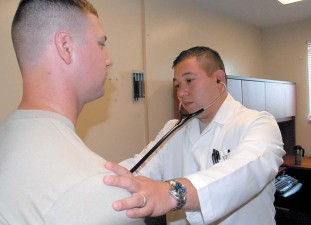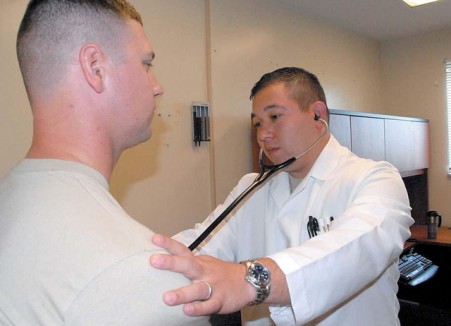How bad would it suck to be financially responsible all your life, diligently saving money all your life for retirement only to find out that you have cancer and only have a few months to live?
It would suck harder than an a capella Black Eyed Peas concert.
That’s why a big part of being financially responsible is being health conscious. You have to survive until retirement for any of your retirement savings to matter.
So how do you increase your chances of living past 60? I’m so glad you asked.
Go to the Doctor When You are Healthy
One of my professors in college told me a story about his brother. I don’t remember his name, so we’ll call him Francisco. That’s a fun name to say. Franciscooooooo.

So Francisco was a healthy young guy, and every year he went to his doctor to get an annual physical. Francisco wasn’t sick; he just wanted the doctor to take a look and make sure he was healthy. One of the most important parts of his annual physical was the bloodwork. Every year, he would have blood drawn and tested.
After many years of healthy check-ups, Francisco went in for another routine physical. They did the bloodwork as usual, and everything came back within the normal range for typical people. However, one of the numbers, while in the normal range for an average person, was pretty high for Francisco compared to his years of previous bloodwork. The doctor did further tests to see if there was anything abnormal causing the spike, and sure enough, he found cancer.
Because the cancer was found so early, Francisco was treated and completely cured relatively easily. If he didn’t have years of bloodwork establishing his own personal “normal” range, then the bloodwork during this visit never would have made the doctor think twice about doing more investigation.
Francisco’s robust history of bloodwork probably saved his life.
Take Advantage of Well Checkups
I literally don’t remember anything about that class expect the story I just told. It stuck with me, and I told myself that I would get a physical with bloodwork every year as soon as I got out of college.
Here I am, three years out of college, and I just finished my fourth annual physical. Four trips to the doctor, and four clean bills of health. Which means I have four years of bloodwork data that can be used if I ever start feeling sick. I’m establishing my own personal “normal range”.
In fact, I even track all my bloodwork in a spreadsheet. Just like all the other spreadsheets I use, I put it on my downloads page and made it available for you to use if you’d like. It not only records all of my bloodwork, but also tells me if any of my new bloodwork is abnormally high or low compared to my previous years. It’s probably the nerdiest thing I’ve ever made. In fact, I showed this spreadsheet to my friend at Harvard Med School, and she called me a supernerd.
But I take my health very seriously.
You can download the spreadsheet here if you want, but that’s only for supernerds. The main point is to get a physical every year.
Get Your Freaking Physical!
I very rarely give blanket advice. When you are talking about someone’s money or their health, it’s always a personal decision. However, if you have health insurance that gives you a free checkup with bloodwork every year, then you need to do it. It would be seriously stupid to ignore it.
And if you don’t have health insurance or your insurance doesn’t cover physicals and bloodwork, I still think you should strongly consider a physical every year. My doctor charges $237.00 for a physical with bloodwork. It sounds like a lot of money, but it can help save you a ton of money by catching a serious disease early. Oh, and it might also save your life, which is probably pretty important too.
So get an annual physical and make sure you live long enough to reap the benefits of your super responsible financial saving habits!
Kevin McKee is an entrepreneur, IT guru, and personal finance leader. In addition to his writing, Kevin is the head of IT at Buildingstars, Co-Founder of Padmission, and organizer of Laravel STL. He is also the creator of www.contributetoopensource.com. When he’s not working, Kevin enjoys podcasting about movies and spending time with his wife and four children.


You beat me to the punch! I was going to write about how I just started tracking my test results in a spreadsheet tab. Oh, wait, I just wrote it anyways! But, I did think it’s noteworthy in that I put it in the same spreadsheet (just as a new tab) as I track everything to do with our finances. So my personal and financial health are now both tracked together. Kinda makes sense if you think about it!
That does make sense. I just have so many tabs in my budget and net worth tracking that I couldn’t add any more without being completely overwhelmed!
You make a good point about creating your own historical reference of your health data. And as people change doctors for various reasons it is a great idea for you to maintain your own data somehow.
I checked out the spreadsheet. I would recommend adding detailed contact information about the lab that did the test and the doctor who should have the official records. That could become helpful if you or someone else needed to retrieve the “official” version of those tests years later.
However I’m not sure I’m in a position to recommend anything. I haven’t been to the doctor in probably 8 years! But I think you have inspired me to go.
That’s a good point. I’m sure if I show this spreadsheet to a doctor, he’ll say “sure sure, can you get me the official records please?” I don’t think any doctor is going to make a medical decision based on information he can’t verify. That would open him or her up to a big lawsuit.
Just out of curiosity, what does it cost to go to the doctor for a check-up (either the total cost if you don’t have insurance, or in the form of a co-pay or something)?
As I mentioned in the article, it would have been $237 for the physical with bloodwork if I didn’t have insurance. However, that’s just my doctor. Other doctors could be much more expensive or much cheaper.
Ah, right. Sorry. Can’t believe I missed that bit.
Great post. My husband delayed having a physical for a number of years. He was healthy and working out three times a week, didn’t seem like a big deal. When he finally went in for a physical he learned he had high cholesterol. Suddenly we wondered if we would be able to enjoy the early retirement we were working so hard for, so we completely changed the way we were eating and turned those cholesterol numbers around.
Regarding spreadsheets…the medical group I’m part of has recently started making test results and appointments and that sort of thing available to patients online. It’s cool because I don’t have to keep a spreadsheet myself. Also, I’m a regular blood donor, and our local blood bank makes blood pressure, iron, pulse, and total cholesterol readings at each donation available online.
Congratulations on your husband fixing his cholesterol. There’s just one more example of a great reason that “healthy” people should go to the doctor and get checked out!
Just so you know… You always give blanket advice.
Yes I do. I try not to, but it’s hard to disclaim every single article. I have to leave it up to the reader to determine if any advice I give is worth taking. I do try to explain both sides though and let people make their own choices, even though I don’t always succeed.
I got bloodwork done for the first time last year … planning on making it an annual habit, especially now that preventative checkups are covered!
Good. I’d prefer that you stay healthy and stick around for a while 🙂
I have had my blood work done for over 10 years now. My triglyceride is through the roof and I need to keep an eye on that. I don’t have all the numbers on a spreadsheet though. I guess it’s time to start.
Yeah it can’t hurt. Good luck with your triglycerides. I have no idea what that means, but I hope it gets better for you.
Now I am feeling rather guilty and am considering scheduling an appointment. I will let you know what happens.
I really think you should. As soon as I learned that preventative checkups could save me from cancer, I was pretty motivated to get my checkups every year.
Great post. Do you also tend to eat healthy to prolong your healthy years? You know, less meat, more veggies, and prehaps the occasional organic item or two?
I’m trying to eat healthy, but it’s hard because I love meat and I hate veggies. Screw organic. As far as I’m concerned, that’s just another word for “overpriced”
I’m not convinced by “organic” myself, but there’s no doubt that less meat – more veg is really important in remaining healthy over the long haul. I looked at your chart and (though I’m no doctor) I know what most of the major indicators should be ’cause I’ve been getting these tests done for several decades. (I’m now 63.) Interesting how your best HDL (good cholesterol) score correlates with your lowest triglycerides. To retireby40 above, I’ve been advised that reducing fats and starches is the best way to get those suckers under control without using medications. I’ve been rigorous about that during these past six months and brought mine down from 220 to 177 (even thought that’s still somewhat too high).
Of course once you get older you need even more thorough testing – PSA for prostate cancer screening, the dreaded (and dreadful) colonoscopy for colon cancer, a stress test for your heart, annual ophthalmological and dermatological exams. And don’t forget dental checkups.
You start to appreciate your health much more as you get older. The rest is not worth much, if you do not have your health.
Ditto. The body can handle more abuse when you’re young, however, so you see lots of kids living on unhealthy diets and doing other unhealthy things like deep suntans and heavy drinking which they could well regret 20-30 years later.
Oh – and one more critical item you might want to keep on your spreadsheet is your blood pressure. If you’ve got a good doctor, I’m sure he/she checks it every visit.
Yeah, I always pay attention to my blood pressure and it’s always around 120/80. I should probably track that one too, but when I hear it’s good, I don’t worry about it.
I actually made the same joke every time. The nurse will take my blood pressure and they’ll say “118/76”. Then I say, “Is that good?” She says, “Yes”. I say, “Good. I’ve been practicing.” hahahahah.
Well, at least I think it’s funny….